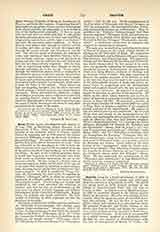

Gravina, Giovanni Vincenzo; Italian jurist and litterateur of the seventeenth and eighteenth centuries; b. at Rogliano, Calabria, January 21, 1664; d. at Rome, January 6, 1718. At the age of sixteen years he went to Naples to study Latin, Greek, and law, not neglecting, however, his mother-tongue. He went to Rome in 1689, where he taught civil and canon law. He had just been called to an important chair of law at the University of Turin when he was attacked by the illness of which he died. The juristic studies to which he devoted himself with more ardor than taste did not cause him to forget poetry. In 1690 he was co-founder, under the name of Opico Erimanto, of the “Accademia degli Arcadi” of Rome, specially devoted to poetry. Later he quarrelled with the members of this academy, and tried unsuccessfully to establish an “Anti-Arcadia”. The freedom with which he spoke of everyone, the good opinion he entertained of himself, and the scorn he exhibited for many literary persons, made him many enemies. But he had the merit of having been the patron of the poet Metastasius. His works on canon law: “Institutiones canonicae” (Turin, 1732, 1742, etc.; ed., Rome, 1832) is a clear, but very elementary handbook. His chief work civil law is “Originum juris civilis libri tres” (Naples, 1701, 1713; Venice, 1730). This was translated into French under the title “Esprit des lois romaines” (Paris, 1775). Another work is “De imperio Romano liber singularis”, published in the editions of his “Originum juris civilis libri tres”. Among his literary works the following are deserving of mention: “Delle antiche favole” (Rome, 1696); “Della Ragione Poetica libri due” (Rome, 1709; Naples, 1716); “Tragedie cinque” (Naples, 1712); “Orationes et Opuscula” (Naples, 1712; Utrecht, 1713); “Della tragedia libro uno” (Naples, 1715).
A VAN HOVE

